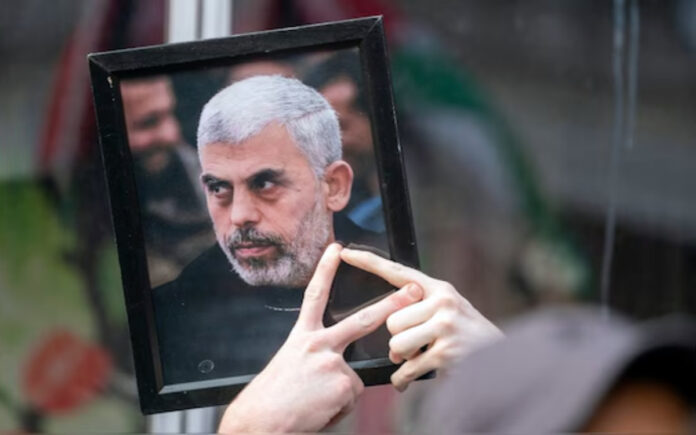Jerusalem: A year after the devastating October 7 attacks, Hamas leader Yahya Sinwar remains resolute in his stance, according to sources familiar with him. Despite the invasion it triggered, which has resulted in tens of thousands of Palestinian deaths and severe destruction in Gaza, Sinwar remains committed to armed resistance as the sole path to a Palestinian nation.
Sinwar, 62, played a crucial role in orchestrating the cross-border raids that led to the deadliest day in Israel’s history. On that day, 1,200 people, primarily civilians, were killed, and 250 hostages were taken, according to Israeli reports. In response, Israel launched a massive offensive, resulting in the deaths of 41,600 people and the displacement of 1.9 million, according to Palestinian health authorities and the U.N.
Wider Conflict and Hezbollah’s Involvement
The aftermath of the attacks has seen the conflict spill into Lebanon, with Israel focusing its efforts on degrading Hezbollah, the Iran-backed militant group. Hassan Hassan, a researcher on Islamic groups, pointed out that Sinwar’s actions have drawn Iran and its “Axis of Resistance,” including Hezbollah, Yemen’s Houthis, and Iraqi militias, into conflict with Israel. Hassan noted that Sinwar’s plan may have backfired, with the “Axis of Resistance” now potentially facing irreversible damage.
“Israel’s military action against Hezbollah has inflicted damage equivalent to a year of attacks on Hamas,” Hassan said, highlighting the decimation of Hezbollah’s leadership, including the assassination of its leader, Hassan Nasrallah.
Sinwar’s Unyielding Grip on Hamas
Despite these setbacks, Sinwar remains firmly in control of Hamas. His predecessor, Ismail Haniyeh, was killed in an Israeli airstrike during a visit to Tehran, though Israel has not confirmed its involvement. Sinwar continues to lead Hamas from an underground tunnel network in Gaza, with Israeli sources reporting that he and his brother have so far survived targeted airstrikes that have killed other senior leaders, including Mohammed Deif.
Operating in secrecy, Sinwar is said to be highly elusive, using trusted messengers for communication and evading Israeli forces. Ceasefire negotiations, primarily mediated by Qatar and Egypt, have stalled, with Sinwar serving as the sole decision-maker for Hamas.
Personal Motivation and Ideology
Sinwar’s determination is rooted in his personal experiences, including an impoverished childhood in Gaza’s refugee camps and 22 years in Israeli custody. His resolve was evident in the 2011 prisoner exchange that saw the release of 1,027 Palestinian prisoners, himself included, in exchange for an Israeli soldier.
Experts on Islamic movements suggest that Sinwar’s hardline stance is driven by a radical Islamist ideology that rejects Israel’s existence and seeks to establish an Islamic state in historic Palestine. The suffering endured by Palestinians is seen as part of a broader belief in sacrifice for the cause.
“He’s ascetic and content with very little. His resolve is powered by his ideology,” said a senior Hamas official who requested anonymity.
Also Read | Fears of Israeli Strikes Prompt Iran to Clear Key Oil Terminal at Kharg Island
Sinwar’s Ascent and Leadership
Sinwar’s journey from a harsh childhood to the leader of Hamas has been marked by significant milestones. He gained recognition as a ruthless enforcer against suspected Israeli informants and later emerged as a hero during his lengthy prison sentence. His leadership has been pivotal in shaping Hamas’ strategy and military capabilities, with strong ties to Iran since his visit in 2012.
Before the October 7 attacks, Sinwar openly declared his intent to strike Israel hard. While the global spotlight is now on the Palestinian issue, his ultimate goal of establishing a Palestinian state remains distant. Israeli Prime Minister Benjamin Netanyahu has rejected any post-war plan that includes a roadmap to Palestinian statehood.
A Leader of Unshaken Resolve
Yahya Sinwar’s life in prison further solidified his uncompromising nature. Former fellow prisoners describe him as dogmatic and unwavering, particularly in his rejection of the 1993 Oslo peace accords. His belief that military confrontation is the only path to liberating Palestine has not wavered.
Sinwar’s leadership qualities were also evident in his ability to command and intimidate even while imprisoned, and his deep connection to Gaza remains unchanged. He frequently expressed his belief that he was “free” even in jail, as long as he was on Palestinian land.
Despite his elusiveness, Sinwar’s influence over Hamas and the broader conflict remains strong. As the conflict drags on, his future actions are likely to shape the course of the Israeli-Palestinian struggle.



